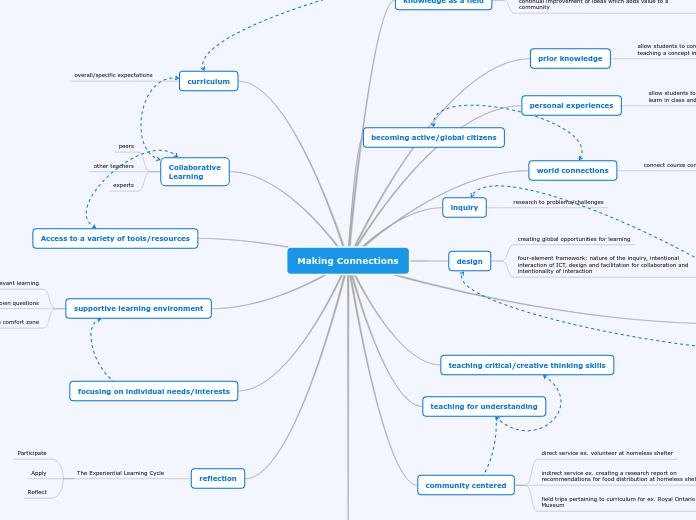Making Connections
knowledge as a field
knowledge building
continual improvement of ideas which adds value to a community
prior knowledge
allow students to connect the context to other subjects (ex. teaching a concept in history but linking it to science)
personal experiences
allow students to draw comparisons between the material they learn in class and their own experiences in life
becoming active/global citizens
world connections
connect course content to global current events
inquiry
research to problems/challenges
design
creating global opportunities for learning
four-element framework: nature of the inquiry, intentional interaction of ICT, design and facilitation for collaboration and intentionality of interaction
assessment/evaluation
assessment for, as, and of learning
peer assessment, self-assessment
variety of forms (ex. rubrics, checklist, exit slips etc...)
teaching critical/creative thinking skills
teaching for understanding
community centered
direct service ex. volunteer at homeless shelter
indirect service ex. creating a research report on recommendations for food distribution at homeless shelter
field trips pertaining to curriculum for ex. Royal Ontario Museum
Technology
blogs, wikis, youtube
discussion forums, knowledge-building forums
skype classroom
Twitter, Facebook
phones, tablets, chrome books
curriculum
overall/specific expectations
Collaborative Learning
peers
other teachers
experts
Access to a variety of tools/resources
supportive learning environment
meaningful & relevant learning
students can ask, explore and formulate their own questions
challenging-stepping out of ones comfort zone
focusing on individual needs/interests
reflection
The Experiential Learning Cycle
Participate
Apply
Reflect
